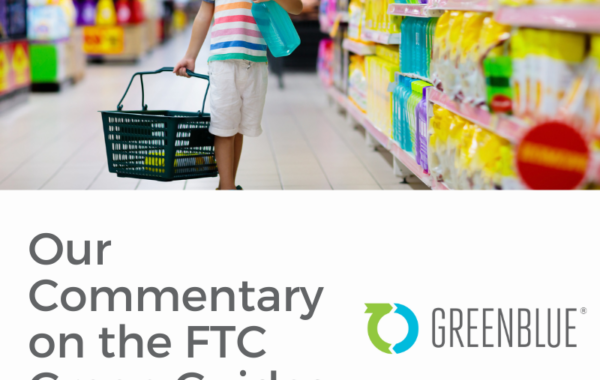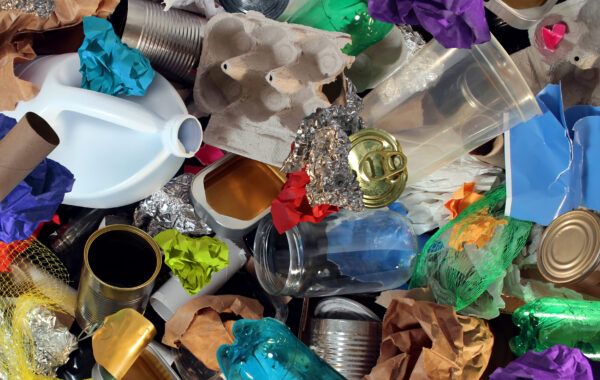March 6, 2019
Sustainable Packaging Coalition and The Center for the Circular Economy at Closed Loop Partners have selected five entrepreneurs and startups that are capable of successfully recovering multi-material flexible packaging waste for new uses.

MARCH 6th — The Sustainable Packaging Coalition (SPC) and The Center for the Circular Economy at Closed Loop Partners have selected five finalists in the FlexPack Recovery Challenge, an open competition launched in October 2018 for entrepreneurs and startups to submit new ideas for reprocessing technologies capable of recovering multi-material flexible packaging waste. The finalists will participate in an entrepreneurs showcase at the SPC’s upcoming conference: SPC Impact 2019 in Seattle, Washington to a dedicated group of brands and packaging suppliers, including members of the SPC’s Industry Leadership Committee on Multi-Material Flexible Recovery, and Challenge sponsors Dow Chemical, RB, and Transcontinental Packaging.

Startups and entrepreneurs from all over the world entered the Challenge with a wide variety of recovery technologies and business models. The finalists selected are representative of the geographical and technological scope of innovators working to solve the problem of recovery options for multi material flexible packaging. Working with academic and industry advisors, Closed Loop Partners and the SPC selected the following companies as finalists:

EcoGlobal is a US-based company with a mechanical recycling technology that converts a mix of LDPE and other inputs into its Ekopolimer material. The mechanical pressing process enables a high tolerance for incorporating mixed material inputs, including a large variety of multi material films. Their material has been used as access mats for construction and other sectors, shipping crates, walkways and low impact roads, storm drains, agriculture, and building materials. EcoGlobal’s products can enable several decades of useful life for repurposed multi material films. Their production facility is based in the Netherlands and the company is looking to commence construction of a North American headquarters. They are actively seeking long-term partnerships with domestic feedstock suppliers and new end market demonstration projects.



Cadel De-Inking is a Spanish company with a water based delamination process that combines elements of both mechanical and chemical recycling. Cadel’s initial work focused on deinking technologies for rigid and mono material plastics. Cadel has recently extended into delamination trials for multi-material flexible packaging with promising results for PE/PET, and metalized BOPP/BOPP. Delamination technology is an emerging field which enables the separation of different polymers and cleans them of impurities like inks and adhesives, opening up their use to a wide range of plastics end markets. Cadel currently has one pilot plant in Spain with a 500-1,000kg/h capacity and is looking to expand plants and sales of their technology in Europe, the US, and Canada.

 RenewELP is a UK-based company with a chemical conversion technology which can convert mixed end-of-life plastics into valuable hydrocarbon products, including synthetic crude oil, and valuable chemicals and waxes. RenewELP uses a unique, hydrothermal upgrading platform, the Cat-HTR (Catalytic Hydrothermal Reactor) gasification process which is particularly well suited to processing of composite film material which is too contaminated for processing by many traditional mechanical recycling methods. CAT-HTR is able to process multi-material plastic packaging containing mixed plastics (including PET) and non-plastic materials (such as paper). ReNew ELP will shortly commence construction of it’s first commercial scale plant that will be able to process 20,000 tonnes of cleaned waste plastic materials at its recently acquired site in England. The long-term ambition of ReNew ELP is to scale up the technology and develop plants across the UK and globally using bespoke models based on varied plastic inputs and sales of various recovered materials.
RenewELP is a UK-based company with a chemical conversion technology which can convert mixed end-of-life plastics into valuable hydrocarbon products, including synthetic crude oil, and valuable chemicals and waxes. RenewELP uses a unique, hydrothermal upgrading platform, the Cat-HTR (Catalytic Hydrothermal Reactor) gasification process which is particularly well suited to processing of composite film material which is too contaminated for processing by many traditional mechanical recycling methods. CAT-HTR is able to process multi-material plastic packaging containing mixed plastics (including PET) and non-plastic materials (such as paper). ReNew ELP will shortly commence construction of it’s first commercial scale plant that will be able to process 20,000 tonnes of cleaned waste plastic materials at its recently acquired site in England. The long-term ambition of ReNew ELP is to scale up the technology and develop plants across the UK and globally using bespoke models based on varied plastic inputs and sales of various recovered materials.

 Synova-BioBTX are Netherlands-based companies who are partnering to combine their chemical conversion technologies using both gasification and pyrolysis as well as gas cleaning to provide a solution to specifically address multi-material flexible packaging. Their combined technology allows for the processing of multi-material flexible packaging into component feedstocks for plastic production (namely Benzene, Toluene, Xylene, Styrene) as well as recycle any aluminum present. BioBTX has developed the Integrated Cascading Catalytic Pyrolysis (ICCP) technology, which when combined with Synova’s gasification will maximize the BTX yield, while minimizing costs. The initial gasification step converts the multi-material flexible packaging into intermediate gases, which in the 2nd reactor catalytically convert into stable molecules, largely consisting of aromatics. The companies are jointly working to develop a commercial plant of approximately 1000kg/hr capacity in the US or Europe and looking to conducts trials with feedstock prior to finalizing the conceptual design for this BTX application. This project is in addition to other plants the two companies are developing separately in other locations.
Synova-BioBTX are Netherlands-based companies who are partnering to combine their chemical conversion technologies using both gasification and pyrolysis as well as gas cleaning to provide a solution to specifically address multi-material flexible packaging. Their combined technology allows for the processing of multi-material flexible packaging into component feedstocks for plastic production (namely Benzene, Toluene, Xylene, Styrene) as well as recycle any aluminum present. BioBTX has developed the Integrated Cascading Catalytic Pyrolysis (ICCP) technology, which when combined with Synova’s gasification will maximize the BTX yield, while minimizing costs. The initial gasification step converts the multi-material flexible packaging into intermediate gases, which in the 2nd reactor catalytically convert into stable molecules, largely consisting of aromatics. The companies are jointly working to develop a commercial plant of approximately 1000kg/hr capacity in the US or Europe and looking to conducts trials with feedstock prior to finalizing the conceptual design for this BTX application. This project is in addition to other plants the two companies are developing separately in other locations.

 Renewlogy is a US-based company with a pyrolysis chemical conversion technology able to convert low-grade plastics into fuel and petrochemical feedstocks. Their process can handle multi-layered flexible packaging and several other commingled and contaminated materials at a higher level than most mechanical recycling. The technology is employed in a modular system with a 10 ton per day capacity which can be scaled up in 10 ton increments. In addition to its processing technology, Renewlogy has proposed a collection system involving placing reverse vending machines as a collection mechanism for flexible packaging in retail stores. This machine, called a “plastic muncher” has been designed and is ready to be deployed. The collected plastics can be transported to the nearest Renewlogy facility. Renewlogy currently has two facilities: one in Salt Lake City, Utah and another in Nova Scotia, Canada. Renewlogy is now sequencing the deployment of its next facilities across North America, and is well-positioned to bring its technology to multiple locations.
Renewlogy is a US-based company with a pyrolysis chemical conversion technology able to convert low-grade plastics into fuel and petrochemical feedstocks. Their process can handle multi-layered flexible packaging and several other commingled and contaminated materials at a higher level than most mechanical recycling. The technology is employed in a modular system with a 10 ton per day capacity which can be scaled up in 10 ton increments. In addition to its processing technology, Renewlogy has proposed a collection system involving placing reverse vending machines as a collection mechanism for flexible packaging in retail stores. This machine, called a “plastic muncher” has been designed and is ready to be deployed. The collected plastics can be transported to the nearest Renewlogy facility. Renewlogy currently has two facilities: one in Salt Lake City, Utah and another in Nova Scotia, Canada. Renewlogy is now sequencing the deployment of its next facilities across North America, and is well-positioned to bring its technology to multiple locations.

“It’s critical to find emerging recovery solutions for emerging types of packaging”, said Adam Gendell, Associate Director of The Sustainable Packaging Coalition. “We believe in the abilities of these five finalists to bring successful new recycling technologies to life and create a more circular system for multi-material flexible packaging.”
“Given the exponential growth of multi-material flexible packaging, we were thrilled to see the sheer volume and diversity of submissions to the Challenge” said Kate Daly, Executive Director of the Center for the Circular Economy. “Keeping valuable materials out of landfill and in the loop is not just good for the environment, it’s good business.”
The finalists will present on the environmental merits and commercial appeal of their recovery technology as well as the scalability of their business model. All finalists will be given the opportunity to connect with over 500 attendees, SPC members and members of the CLP community at SPC Impact, April 1-4, 2019, during the FlexPack Showcase event. One winner will be selected at the Showcase who will receive a year of free membership to the SPC and enter into a mentorship program administered by the CLP and SPC. Follow us on Twitter @SPCspotlight by #SPCimpact for pictures and news from the finalist showcase at SPC Impact 2019.
About the Sustainable Packaging Coalition
The Sustainable Packaging Coalition® is a membership-based collaborative led by an independent nonprofit that believes in the power of industry to make packaging more sustainable. Using an objective lifecycle-based approach, we work in a constructive atmosphere to provide thought leadership and bring our members together to strengthen and advance the business case for more sustainable packaging.
About The Center for The Circular Economy at Closed Loop Partners
Closed Loop Partners is an investment platform that invests in sustainable consumer goods, recycling and the development of the circular economy. Investors include many of the world’s largest consumer goods companies and family offices interested in investments that provide strong financial returns and tangible social impact. In 2018, Closed Loop Partners launched the Center for the Circular Economy, a New York City-based collaboration center for innovators to commercialize products, services and technologies that are leading the transition from a linear take, make, waste economy to a restorative one in which materials are shared, re-used, and continuously cycled. Learn more at www.closedlooppartners.com.





